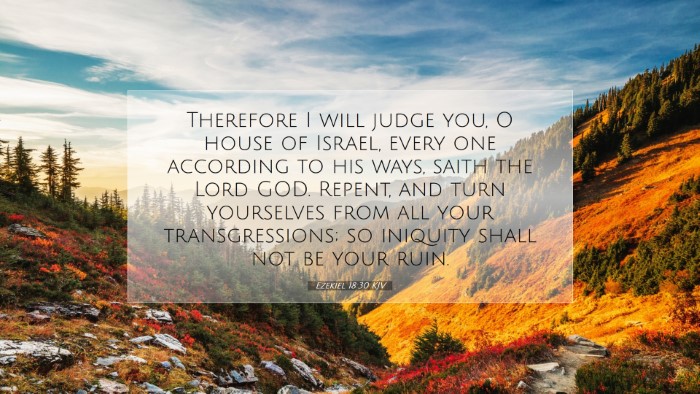Ezekiel 18:30 - Bible Commentary
Verse: "Therefore I will judge you, O house of Israel, every one according to his ways, saith the Lord God. Repent, and turn yourselves from all your offenses; so sin shall not be your ruin."
Introduction
The verse in Ezekiel 18:30 presents a profound and timely call to repentance, emphasizing God's desire for the restoration of His people. In this commentary, we will explore insights from noted public domain commentaries such as Matthew Henry, Albert Barnes, and Adam Clarke to provide a deeper understanding of the theological, historical, and practical implications of this scripture.
Contextual Background
The Book of Ezekiel, a prophetic text, highlights God’s dealings with Israel during a time of exile. The prophet Ezekiel, called to be a watchman, conveys God's messages of judgment and hope. In chapter 18, Ezekiel refutes the prevailing notion of collective guilt and stresses personal responsibility in sin and repentance. The context of this particular verse serves as both a warning and a promise of restoration, underlining the importance of individual accountability before God.
Exegesis of the Verse
Ezekiel 18:30 opens with a strong imperative from God: "Therefore I will judge you." This declaration asserts God's authority over Israel and sets a serious tone. The phrase "every one according to his ways" emphasizes the individual nature of divine judgment, which stands in contrast to the communal sinfulness often perceived by the Israelites.
Analysis of Themes
-
Judgment and Accountability:
Matthew Henry notes that God's judgment is impartial, with each individual facing the consequences of their own actions. This contrasts sharply with the Hebrew tradition of viewing sin through a communal lens. Each person is accountable to God for their conduct, which reinforces the idea that spiritual responsibility is a personal matter.
-
Call to Repentance:
In this verse, God calls His people to "repent, and turn yourselves from all your offenses." This is a critical point where God extends His mercy, urging sinners to recognize their transgressions and seek a return to righteousness. Albert Barnes asserts that this call underscores the detestability of sin and the necessity of turning away from it to find life.
-
The Consequence of Sin:
The latter part of the verse states, "so sin shall not be your ruin." Adam Clarke emphasizes that this illustrates God's desire for His people not to perish in their sins. Instead, it signifies that while sin leads to death, repentance opens the door to restoration and life. The call to forsake sin is coupled with the promise of God’s grace toward those who would return to Him.
Theological Implications
The foundational theological concept in Ezekiel 18:30 revolves around the character of God as both just and merciful. God’s willingness to forgive is contingent upon genuine repentance, showing that the relationship between divine justice and mercy is complex yet beautifully intertwined.
Additionally, this verse highlights the transformative power of repentance. It invites the reader to consider not just the act of turning away from sin but the process of renewal and restoration. As noted by Henry, true repentance often leads to a change in the heart and mind, which transforms behavior in a way that aligns with God's will.
Practical Applications
For pastors and leaders, Ezekiel 18:30 serves as a potent reminder of the necessity of encouraging genuine repentance within the community. The call to turn from sin is as relevant now as it was during Ezekiel's time. Preaching and teaching that emphasize personal accountability can lead to transformative experiences within congregations.
For students and theologians, this passage invites critical reflection on the nature of sin and divine grace. It poses questions regarding the ways in which the church addresses sin and repentance today. The verse can serve as a lens through which to evaluate current theological constructs about judgment and salvation.
Conclusion
In summary, Ezekiel 18:30 encapsulates a universal truth about God's character—He is both just and merciful, calling individuals to recognize their shortcomings and seek a restored relationship with Him. It affirms that while the challenge of sin is real, God's call to repentance offers hope and the possibility of renewal. Understanding this verse in its full context enriches our theological perspectives and personal walks with God.
As we engage with this scripture, let us take to heart the call to repentance and the assurance that turning back to God is met with open arms, as He desires not the death of the wicked, but that they should turn from their ways and live.


